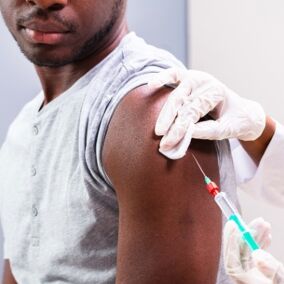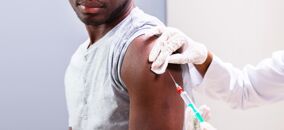
A new study looks at the link between PrEP use and sexually transmitted infections.
PrEP use amongst gay men has increased significantly over the last decade. This has contributed to a drop in HIV infections. At the same time, there has been an increase in rates of chlamydia, gonorrhea, and syphilis.
It’s been assumed by many that this is because many people guys taking PrEP decide to stop using condoms. Ditching condoms increases the likelihood of acquiring other STIs.
How about we take this to the next level?
Subscribe to our newsletter for a refreshing cocktail (or mocktail) of LGBTQ+ entertainment and pop culture, served up with a side of eye-candy.
It seems a pretty logical, right?
Well, this new study of Danish men says this might not be the case.
The research was published in Eurosurveillance. It looked at just over 1,300 men who took PrEP. It monitored their sexual health history both before and after they started the medication.
The study found that cases of chlamydia and gonorrhea were greater among the men on PrEP. This was particularly the case for rectal infections. Rectal chlamydia doubled and rectal gonorrhea went up by a factor of almost 2.5.
The study notes that once on PrEP, the men were getting tested for STIs every 3-6 months. Men not taking PrEP tend not to get tested so regularly. This is one reason why there might be a greater increase in diagnoses once people get on to the drugs.
However, crucially, the increase in STIs began 10-20 weeks before the men started taking PrEP.
This was unexpected.
“This challenges prior assumptions about the relationship between PrEP usage and STI incidence,” noted the researchers.
What prompts the decision to start PrEP?
The scientists say that if PrEP prompts people to abandon condoms, a rise in STIs would occur only after they start on the medication.
“As no such increase was seen, an alternative interpretation to the association between PrEP and STIs is that changes in sexual risk-taking lead people to PrEP.”
There could be many reasons for this. Perhaps condomless sex is becoming more normalized and people are beginning to take more risks, and then only thinking afterward, “I guess I should get on to PrEP.”
Or, maybe someone got an STI, went to a clinic, and the health worker talked to them about starting PrEP.
There are many possible scenarios. This study suggests it’s not as simple as PrEP leads to condomless sex, which leads to STIs.
“Regardless of the underlying reason behind the STI risk increase, the association between STIs and PrEP does not imply that PrEP causes sexual risk compensation,” they say. “Rather, it indicates that PrEP is being given when the risk of STIs is increased, i.e. when it is most needed.”
In this context, “sexual risk compensation” translates as when one reduces risk by one method, one engages in other risks. For example, PrEP leads to less condom use, increasing the risk of acquiring STIs.
The scientists concluded, “Our findings suggest that individuals frequently seek PrEP during periods when they are at increased risk of contracting STIs. This makes PrEP programmes a critical point of intervention, both for preventing HIV and STIs.
“For PrEP programmes in similar settings, our findings emphasise the need to go beyond just dispensing medication. It is crucial to provide a safe and supportive environment that includes comprehensive sexual health consultations, along with STI testing, treatment and prevention strategies.”
Get regularly tested!
PrEP is known to be highly effective at protecting users from acquiring HIV. For maximum protection against other STIs, also use condoms. Whether you’re on the medication or not, do have a regular sexual health check-up, especially if you have multiple partners.
Related*


An “ultra” PrEP injection just three times a year could be on the way
It also has implications for longer-lasting HIV treatment.


New study on condom use among queer men unveils some surprising & alarming findings
Is it time to make condoms fashionable again?











































Bosch
Every new profylactic is blamed for promiscuity. I’ve yet to hear though in which period of history humans were less promiscuous.
Openminded
good point
motownbln
Dear David Hudson and dear folks at queerty.com, this seems to be a study of Danish men, not Dutch men.
David Hudson
Thank you – corrected.
Kangol2
Queerty, this is clearly a study of Danish men, not Dutch men. The study’s title is “Questioning risk compensation: pre-exposure prophylaxis (PrEP) and sexually transmitted infections among men who have sex with men, capital region of Denmark, 2019 to 2022 separator.” Please rectify this in the article above. That said, the larger point is a good and correct one.
Stefano
It’s important to get tested regularly when you have many partners (of all sexes). Not only to protect yourself, but also to avoid infecting others. It’s a question of respect! Finally, an article that makes sense.